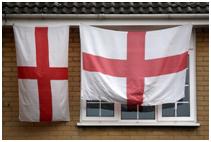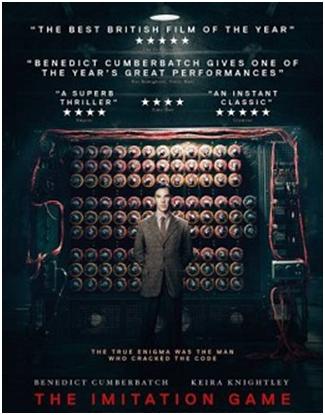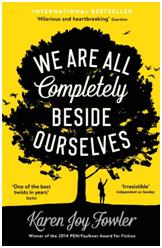 I must admit I was totally at a loss when the White Van Man story broke during the Rochester bye-election. A photo of Dan Ware's family home got the political classes all a-twitter. Just what was so wrong about the picture tweeted by a Labour shadow minister Emily Thornberry? A house, a white van and a collection of England flags. And the message? Hmmm. That was the problem. The message is what people read into the picture. Labour is sneering at… whom? Ok, for a public figure, the tweet was misguided. It was a picture of a family home that was readily identified by the wider press, not really fair on the family. It was the picture of the home of a serious England football supporter.
I must admit I was totally at a loss when the White Van Man story broke during the Rochester bye-election. A photo of Dan Ware's family home got the political classes all a-twitter. Just what was so wrong about the picture tweeted by a Labour shadow minister Emily Thornberry? A house, a white van and a collection of England flags. And the message? Hmmm. That was the problem. The message is what people read into the picture. Labour is sneering at… whom? Ok, for a public figure, the tweet was misguided. It was a picture of a family home that was readily identified by the wider press, not really fair on the family. It was the picture of the home of a serious England football supporter.
Personally, I think that only people who should be hanging their heads in shame are those who run the Football Association for their incompetence. Mr Ware and all of us are consistently let down by the lack-lustre performance of England's football team. Come on, we have world class athletes because of world-class organisation. And the Football Association? Just as well they were not running the 2012 Olympic Games. We would still be waiting for the venues to be finished. And as for winning medals… If we as a nation are capable of fielding a world class athletics team, ought we not be capable of fielding a world class football team?
But that is enough of football. The story of Dan Ware and his white van has some serious lessons for all the political parties, especially the Labour Party. There is no evidence that Mr Ware is a political animal. It is extremely unlikely, that however much the political parties begged and pleaded and sucked up to Mr Ware, he would have voted at all in this bye-election. Mr Ware, like a sizeable proportion of the population, does not belong to the voting classes, and it is the voting classes who matter in any election.
And just who are the voting classes? Some people have their favourite teams, just like Mr Ware, and they will vote consistently for their team. Switching allegiances to another team seldom happens. If your team disappoints, you just don't vote. But why the allegiance in the first place? Perhaps it is something to do with class, a great British preoccupation. It is more to do with people like me, and people who share my dreams and aspirations, and people who understand my fears. And then there is the consumerist aspect. I vote for the candidate/party who will do the most for me and my family, a secondary factor may well be who will do the best for my country. And also there is ideology. A shared vision, a shared vision – I vote for the party/candidate who shares my beliefs. Complex. All political parties are out to get your vote, and are determined to show that they are people like you and me.
For too long the Labour party has not looked at what s really happening out there in the constituencies. If a voter votes for a party who is "most like me", then it is even more so for membership of political parties. Imagine Mr Ware turning up at a constituency party meeting. Mr Ware is self-employed, with several business ventures. He is not anti-capitalist, he does not have great allegiance to the collective power of the trade unionists, and he is English working class of working age. All of which sort of excludes him from membership of the Labour party, and the Conservative party. Lib Dems? No. UKIP perhaps? A young party, with no clearly defined membership profile? If Mr Ware decided to join a political party, this is probably the party he would join.
This is the problem for the Labour Party, the roots of which are an alliance of the interests of the working classes in a bygone age and those who bought into an ideology which promoted a more equal and just society. The key is the bygone age. The lives of working class people has changed dramatically over the last few decades. Industry is not what it used to be. Employment is more fragmented. Collectivism only exists in a few places. And so the Labour Party has become the domain of public servants, health workers and some trade unionists. White Van man, the self employed tradesman does not fit into this picture at all.
Both Tony Blair and Margaret Thatcher understood a fundamental truth of our democracy, that people have aspirations, that people want autonomy and the tools to be able to support themselves and their families. Unless the Labour Party looks again at the legacy of Tony Blair and his Mondeo Man, the Labour party will replace the Lib Dems as the rump third party in our democracy.


 This is an extremely enjoyable film, even if the local cinema messed up the projection. There we were, just up to the point where Turing's Apspergers is obvious (a discussion on invitation to lunch) when the film stopped. And we had to endure 20 minutes of interruption while the manager/projectionist struggled to fix an incredibly minor fault in projection – something to do with an orange cast on the screen. But eventually the film was resumed and the enjoyment continued. OK – so the story had been simplified for screen consumption – but so what? This is a great story – a formidable mathematical genius who is able to circumvent norms of society in order to achieve the construction of the first digital computer to decrypt the enigma code.
This is an extremely enjoyable film, even if the local cinema messed up the projection. There we were, just up to the point where Turing's Apspergers is obvious (a discussion on invitation to lunch) when the film stopped. And we had to endure 20 minutes of interruption while the manager/projectionist struggled to fix an incredibly minor fault in projection – something to do with an orange cast on the screen. But eventually the film was resumed and the enjoyment continued. OK – so the story had been simplified for screen consumption – but so what? This is a great story – a formidable mathematical genius who is able to circumvent norms of society in order to achieve the construction of the first digital computer to decrypt the enigma code.


 Second point. The cake. It is within the gift of the state to determine what relationships can be determined as marriage. For instance, in the UK first cousins can marry. But Canon Law in the Catholic Church decrees that first cousins cannot marry. In the UK, divorced parties can remarry, in Ireland this is a comparatively recent phenomenon. And so it is with gay marriage. It is the state which decides on this matter. In Northern Ireland, the State has decreed that the only marriage recognised is between one man and one woman. To change the mind of the state is a political act. And so, the slogan "Support Gay Marriage" serves a political end, to change the mind of the state and to enable gay marriage. Should a cake bearing a political slogan, for a campaigning event be treated, in the same way as a real wedding cake or other celebratory cake that would celebrate the union between a gay couple. The gay activist was asking the baker to produce a cake with a political slogan he did not agree with. Suppose the slogan was "Support Joining the Euro" and the baker was a well known UKIP supporter. Would anyone be surprised that the bake would turn down this commission?
Second point. The cake. It is within the gift of the state to determine what relationships can be determined as marriage. For instance, in the UK first cousins can marry. But Canon Law in the Catholic Church decrees that first cousins cannot marry. In the UK, divorced parties can remarry, in Ireland this is a comparatively recent phenomenon. And so it is with gay marriage. It is the state which decides on this matter. In Northern Ireland, the State has decreed that the only marriage recognised is between one man and one woman. To change the mind of the state is a political act. And so, the slogan "Support Gay Marriage" serves a political end, to change the mind of the state and to enable gay marriage. Should a cake bearing a political slogan, for a campaigning event be treated, in the same way as a real wedding cake or other celebratory cake that would celebrate the union between a gay couple. The gay activist was asking the baker to produce a cake with a political slogan he did not agree with. Suppose the slogan was "Support Joining the Euro" and the baker was a well known UKIP supporter. Would anyone be surprised that the bake would turn down this commission?


 OK, so I was supposed to be listening to "The Narrow Road to the Deep North" on my daily commute. A worthy book, but definitely one for the chaps I think. I feel sort of guilty abandoning it in favour of this book. But it was such a relief to listen to a light-hearted narrator. Although I know, from reading other reviews, "we are all completely beside ourselves" is not really a light hearted romp, but is in fact a lot more serious. And I do wish I hadn't read all those reviews for I now have some expectations. But still. So far, this is a really good book to listen to while driving. This promises to be a "cracking good read".
OK, so I was supposed to be listening to "The Narrow Road to the Deep North" on my daily commute. A worthy book, but definitely one for the chaps I think. I feel sort of guilty abandoning it in favour of this book. But it was such a relief to listen to a light-hearted narrator. Although I know, from reading other reviews, "we are all completely beside ourselves" is not really a light hearted romp, but is in fact a lot more serious. And I do wish I hadn't read all those reviews for I now have some expectations. But still. So far, this is a really good book to listen to while driving. This promises to be a "cracking good read".